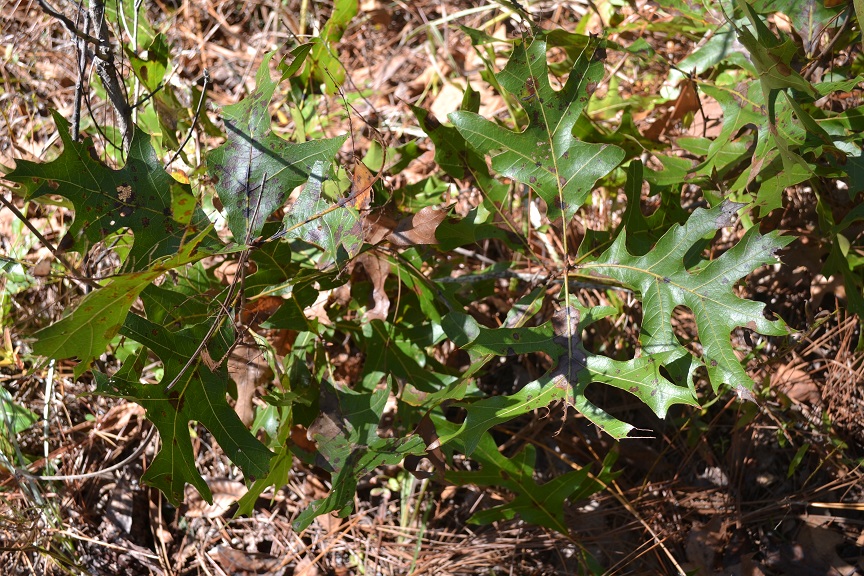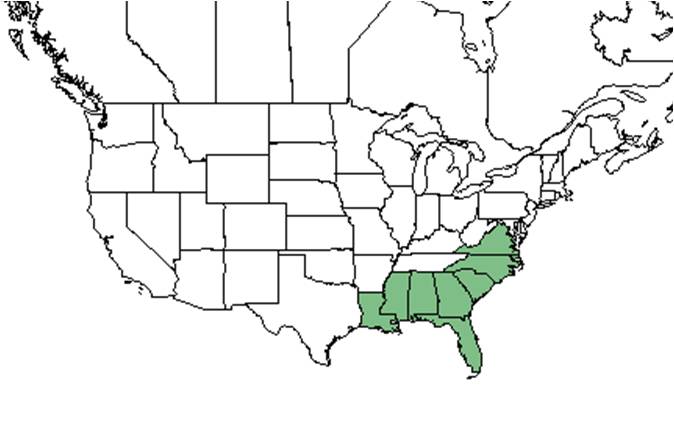Difference between revisions of "Quercus laevis"
(→References and notes) |
|||
| Line 20: | Line 20: | ||
Common name: Turkey oak | Common name: Turkey oak | ||
==Taxonomic notes== | ==Taxonomic notes== | ||
| + | Synonym: ''Quercus catesbaei'' Michaux | ||
| + | |||
==Description== | ==Description== | ||
<!-- Basic life history facts such as annual/perrenial, monoecious/dioecious, root morphology, seed type, etc. --> | <!-- Basic life history facts such as annual/perrenial, monoecious/dioecious, root morphology, seed type, etc. --> | ||
| Line 29: | Line 31: | ||
''Quercus laevis'' is restricted to native groundcover with a statistical affinity in upland pinelands of South Georgia. <ref name=ost>Ostertag, T.E., and K.M. Robertson. 2007. A comparison of native versus old-field vegetation in upland pinelands managed with frequent fire, South Georgia, USA. Pages 109–120 in R.E. Masters and K.E.M. Galley (eds.). Proceedings of the 23rd Tall Timbers Fire Ecology Conference: Fire in Grassland and Shrubland Ecosystems.</ref> | ''Quercus laevis'' is restricted to native groundcover with a statistical affinity in upland pinelands of South Georgia. <ref name=ost>Ostertag, T.E., and K.M. Robertson. 2007. A comparison of native versus old-field vegetation in upland pinelands managed with frequent fire, South Georgia, USA. Pages 109–120 in R.E. Masters and K.E.M. Galley (eds.). Proceedings of the 23rd Tall Timbers Fire Ecology Conference: Fire in Grassland and Shrubland Ecosystems.</ref> | ||
| − | ===Phenology=== <!--Timing off flowering, fruiting, seed dispersal, and environmental triggers. Cite PanFlora website if appropriate: http://www.gilnelson.com/PanFlora/ --> | + | <!--===Phenology===--> <!--Timing off flowering, fruiting, seed dispersal, and environmental triggers. Cite PanFlora website if appropriate: http://www.gilnelson.com/PanFlora/ --> |
===Seed dispersal=== | ===Seed dispersal=== | ||
According to Kay Kirkman, a plant ecologist, this species disperses by gravity. <ref name="KK"> Kay Kirkman, unpublished data, 2015. </ref> | According to Kay Kirkman, a plant ecologist, this species disperses by gravity. <ref name="KK"> Kay Kirkman, unpublished data, 2015. </ref> | ||
| − | ===Seed bank and germination=== | + | <!--===Seed bank and germination===--> |
| − | ===Fire ecology=== <!--Fire tolerance, fire dependence, adaptive fire responses--> | + | <!--===Fire ecology===--> <!--Fire tolerance, fire dependence, adaptive fire responses--> |
| − | ===Pollination=== | + | <!--===Pollination===--> |
| − | + | <!--===Use by animals===--> <!--Herbivory, granivory, insect hosting, etc.--> | |
| − | ===Use by animals=== <!--Herbivory, granivory, insect hosting, etc.--> | + | <!--===Diseases and parasites===--> |
| − | ===Diseases and parasites=== | ||
==Conservation and Management== | ==Conservation and Management== | ||
==Cultivation and restoration== | ==Cultivation and restoration== | ||
Revision as of 18:36, 2 May 2016
| Quercus laevis | |
|---|---|

| |
| Photo by Kevin Robertson | |
| Scientific classification | |
| Kingdom: | Plantae |
| Division: | Tracheophyta- Vascular plants |
| Class: | Magnoliopsida - Dicotyledons |
| Order: | Fagales |
| Family: | Fagaceae |
| Genus: | Quercus |
| Species: | Q. laevis |
| Binomial name | |
| Quercus laevis Walter | |

| |
| Natural range of Quercus laevis from USDA NRCS Plants Database. | |
Common name: Turkey oak
Contents
Taxonomic notes
Synonym: Quercus catesbaei Michaux
Description
A description of Quercus laevis is provided in The Flora of North America.
Distribution
Ecology
Habitat
Quercus laevis is restricted to native groundcover with a statistical affinity in upland pinelands of South Georgia. [1]
Seed dispersal
According to Kay Kirkman, a plant ecologist, this species disperses by gravity. [2]
Conservation and Management
Cultivation and restoration
Photo Gallery
References and notes
- ↑ Ostertag, T.E., and K.M. Robertson. 2007. A comparison of native versus old-field vegetation in upland pinelands managed with frequent fire, South Georgia, USA. Pages 109–120 in R.E. Masters and K.E.M. Galley (eds.). Proceedings of the 23rd Tall Timbers Fire Ecology Conference: Fire in Grassland and Shrubland Ecosystems.
- ↑ Kay Kirkman, unpublished data, 2015.